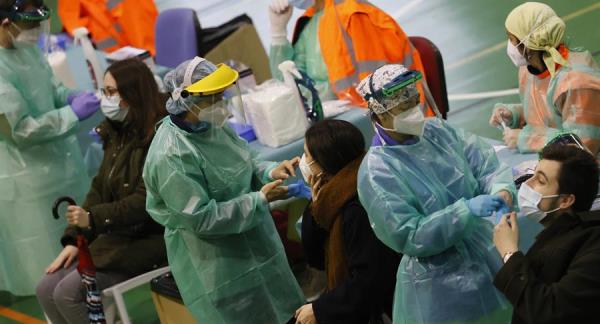BERLIN.- Germany on Monday took a step back in its recently started de-escalation in the face of the rebound in the incidence, announced a general closure for Easter and forced the retail trade of half the country to lower the blind again.
The German Chancellor, Angela Merkel, and the heads of government of the 16 federated states agreed in a tense meeting of more than 11 hours this step, given the impetus that the third wave has taken – with the British variant already as the majority – when still the second had not been completely appeased.
The cumulative incidence at seven days stood this Monday at 107.3 cases per 100,000 inhabitants, when on February 15 it was 58.9 (after the 197.6 on December 22). In the previous 24 hours, 7,709 positives and 50 deaths were registered in the country. More than 3,000 people are admitted with covid in ucis.
The chancellor warned that the situation is “very serious” and pointed out the importance of not “overloading the health system.” “We have a new pandemic with the spread of the British variant,” Merkel said, noting that this mutation is “more deadly, more infectious” and causes longer convalescence.
The agreement includes extending the general restrictions until April 18, reducing interpersonal contacts to a person who does not live together and even foresees curfews in localities where the cumulative incidence exceeds 100 new cases per 100,000 inhabitants in seven days. .
In these places, which already account for around half the country, the so-called “emergency brake” agreed on March 3 will be applied, which implies reversing the de-escalation step on March 8.
Thus the retail trade, museums and sports centers will have to close in those regions, when they had only been open for two weeks. Schools, however, may remain open.
“It was absolutely essential to use the emergency brake,” justified the chancellor.
In addition, the Easter holidays will be extended ahead and behind, between April 1 and 6. Only some essential shops – and with limitations – will be able to open these days, such as gas stations, pharmacies and food stores.
During all these days there will be a national ban on gathering in public spaces, the same as the one approved to avoid the festive crowds of New Year’s Eve and New Year’s Eve.
“We see the intensity of the exponential growth and I believe that the extra days of Easter will be a contribution to the efforts to control the pandemic,” said the chancellor.
The chancellor acknowledged that the start of the de-escalation approved three weeks ago entailed a series of “risks” that have ended up materializing.
PCR FOR ALL TRAVELERS
Merkel and regional leaders also agreed to extend to all travelers arriving in the country the obligation to undergo a PCR test, regardless of place of origin, when until now this measure was limited to those considered “risk areas.”
This decision is its response to the controversy surrounding the Easter holidays in Mallorca, the demand for which had skyrocketed after the German authorities removed the Balearic Islands from the list of risk areas, which eliminated the obligation to test and quarantine.
Thus, the Chancellor added, a “general obligation” to take a test to enter the country, said the Chancellor, who recalled that the German Government advises against “in general all trips that are strictly necessary.”
On March 12, the German authorities removed the Balearic Islands from the list of risk areas (along with five other Spanish autonomous communities), which unleashed the demand for flights and stays on the island for the Easter holidays.
The situation caused a strong controversy in Spain, where the majority of citizens will not be able to leave their autonomous community at Easter due to the restrictions of the pandemic; but also in Germany, where domestic tourism is currently prohibited, which poses serious economic difficulties for the sector.

